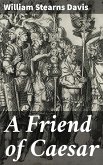In "Caesar Dies," Talbot Mundy intricately weaves a narrative steeped in historical intrigue, exploring the tumultuous period of the Roman Empire with vivid prose and rich character development. This novel delves into the fallibility of power and the resilience of the human spirit through the lens of dramatic historical events, evoking a sense of both grandeur and tragedy. Mundy's stylistic approach combines journalistic detail with compelling storytelling, immersing readers in the socio-political landscape of ancient Rome while offering profound insights into the human condition, reflecting themes of betrayal, ambition, and the quest for identity amidst chaos. Talbot Mundy, a writer with a diverse background that included travels and experiences across the globe, was profoundly influenced by the rugged histories of empires and cultures he encountered. His deep understanding of human psychology and the intricacies of power dynamics often illuminated his works, allowing him to depict characters that resonate deeply with readers. "Caesar Dies" stands as a testament to his skill in blending fact with fiction, drawing on his extensive knowledge of both history and mythology to create a compelling narrative. I highly recommend "Caesar Dies" for readers seeking a rich historical tapestry infused with vivid storytelling and philosophical depth. Mundy's ability to breathe life into the past makes this book not only an engaging read but also a thought-provoking exploration of the timeless themes of ambition and morality. It is a must-read for history enthusiasts and lovers of literary fiction alike.
Dieser Download kann aus rechtlichen Gründen nur mit Rechnungsadresse in A, B, BG, CY, CZ, D, DK, EW, FIN, F, GR, H, IRL, I, LT, L, LR, M, NL, PL, P, R, S, SLO, SK ausgeliefert werden.









